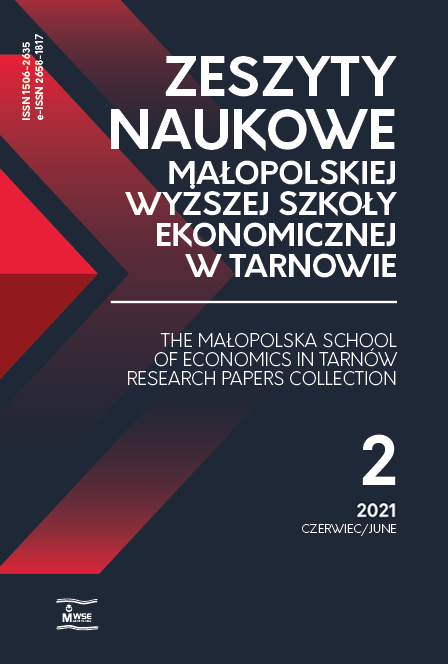Abstract
The SARS-CoV-2 virus outbreak came suddenly, devastating the health systems of other countries regardless of the financial condition of individual countries. And although at the end of 2019 it seemed that it would remain a problem in the Far East, the mechanisms related to globalization and human mobility meant that within a few weeks the strength and capabilities of almost the entire globe were exposed to a huge challenge—similar for every country. All of this took place at a time when analysts boldly predicted another financial crisis—at a time of raging economic processes. These, in turn, are closely related to the necessity to incur foreign debts—especially in the case of developing countries. Therefore, it seems reasonable to analyze the current information in this regard, based on the published data and the position of analysts in this problematic area. At the same time, it will be an introduction to further analyses in-depth with comprehensive data for the coming months.
References
Babu, J. O., Kiprop, S., Kalio, A. M., Gisore. M. (2015). Effect of domestic debt on economic growth in the East African community. American Journal of Research Communication, 3(9), 73–95. ISSN 2325-4076.
View in Google Scholar
Bauman, Z. (2000). Globalizacja: I co z tego dla ludzi wynika. Warszawa: Państwowy Instytut Wydawniczy. ISBN 8306028279.
View in Google Scholar
Bilewicz, E. (2014). Zagraniczny dług publiczny krajów rozwijających się. Zeszyty Naukowe Uniwersytetu Szczecińskiego. Studia i Prace Wydziału Nauk Ekonomicznych i Zarządzania, 1(37), 125–135.
View in Google Scholar
Głuch, J., Grotte, M. (2007). Wskaźniki zadłużenia zewnętrznego krajów. Zeszyty Naukowe Kolegium Gospodarki Światowej, 21, 201–213.
View in Google Scholar
Gohar, M., Bhutto, N. A., Butt, F. (2012). The impact of external debt servicing on the growth of low-income countries. Proceedings of 2nd International Conference on Business Management. DOI: 10.20472/IAC.2019.052.046.
View in Google Scholar
Hawker, E. (2020). COVID-19: The impact on developing economies [online, accessed: 2020-11-20]. Retrieved from: https://www.businessbecause.com/news/insights/7052/covid-19-impact-on-developing-economiespage=2.
View in Google Scholar
IMF. (2020a). The Great Lockdown. World Economic Outlook [online, accessed: 2020-11-20]. Retrieved from: https://www.imf.org/en/Publications/WEO/Issues/2020/04/14/weo-april-2020.
View in Google Scholar
IMF. (2020b). The debt pandemic [online, accessed: 2020-11-20]. Retrieved from: https://www.imf.org/external/pubs/ft/fandd/2020/09/debt-pandemic-reinhart-rogoff-bulow-trebesch.htm.
View in Google Scholar
Kose, M. A., Ohnsorge, F., Nagle, P., Sugawara, N. (2020). Caught by the cresting debt wave. Finance & Development, 57(2), 40–43.
View in Google Scholar
Liberska, B. (2002). Globalizacja. Mechanizmy i wyzwania. Warszawa: Polskie Wydawnictwo Ekonomiczne. ISBN 8320813786.
View in Google Scholar
Loayza, N. V. (2020). Costs and trade-offs in the fight against the COVID-19 pandemic: A developing country perspective. Research & Policy Briefs, 35.
View in Google Scholar
Nakonieczna-Kisiel, H. (2014). Obciążenie gospodarki długiem zagranicznym w okresie członkostwa Polski w Unii Europejskiej. Zeszyty Naukowe Uniwersytetu Szczecińskiego. Studia i Prace Wydziału Nauk Ekonomicznych i Zarządzania, 37(1), 181–193.
View in Google Scholar
OECD. (2020). The impact of the coronavirus (COVID-19) crisis on development finance [online, accessed: 2020-11-20]. Retrieved from: http://www.oecd.org/coronavirus/policy-responses/the-impact-of-the-coronavirus-covid-19-crisis-on-development-finance-9de00b3b/.
View in Google Scholar
Paczos, W., Shakhnov, K. (2020). Sovereign risk after Covid-19: Don’t forget domestic debt [online, accessed: 2020-11-20]. Retrieved from: https://voxeu.org/article/sovereign-risk-after-covid-19.
View in Google Scholar
Raczkowski, K. (2012). Percepcja bezpieczeństwa ekonomicznego i wyzwania dla zarządzania nim w XXI wieku. In: K. Raczkowski (ed.). Bezpieczeństwo ekonomiczne. Wyzwania dla zarządzania państwem. Warszawa: Wolters Kluwer.
View in Google Scholar
Raczkowski, K. (2014). Współczesny model tetrarchii zarządzania a bezpieczeństwo ekonomiczne obrotu gospodarczego. In: K. Raczkowski (ed.). Bezpieczeństwo ekonomiczne obrotu gospodarczego. Ekonomia. Prawo. Zarządzanie, Warszawa: Wolters Kluwer.
View in Google Scholar
UNCTAD. (2008). Trade and Development Report. New York and Geneva: United Nations Publications.
View in Google Scholar
UNWTO. (2020). Tourism and COVID-19 [online, accessed: 2020-11-20]. Retrieved from: https://webunwto.s3.eu-west-1.amazonaws.com/s3fs-public/2020-04/COVID19_NewDS_.pdf.
View in Google Scholar
World Bank. (2020a). Implications of COVID-19 for commodities [online, accessed: 2020-11-20]. Retrieved from: https://openknowledge.worldbank.org/bitstream/handle/10986/33624/CMO-April-2020.pdf.
View in Google Scholar
World Bank. (2020b). The global economic outlook during the COVID-19 pandemic: A changed world [online, accessed: 2020-11-20]. Retrieved from: https://www.worldbank.org/en/news/feature/2020/06/08/the-global-economic-outlook-during-the-covid-19-pandemic-a-changed-world.
View in Google Scholar
World Bank. (2020c). World Bank predicts sharpest decline of remittances in recent history [online, accessed: 2020-11-20]. Retrieved from: https://www.worldbank.org/en/news/press-release/2020/04/22/world-bank-predicts-sharpestdecline-of-remittances-in-recent-history.
View in Google Scholar
Żukrowska, K. (2013). Ekonomia jako sfera bezpieczeństwa państwa. In: K. Raczkowski, K. Żukrowska, M. Żuber (eds.). Interdyscyplinarność nauk o bezpieczeństwie (pp. 31–50). Warszawa: Difin.
View in Google Scholar

This work is licensed under a Creative Commons Attribution-NonCommercial-NoDerivatives 4.0 International License.

